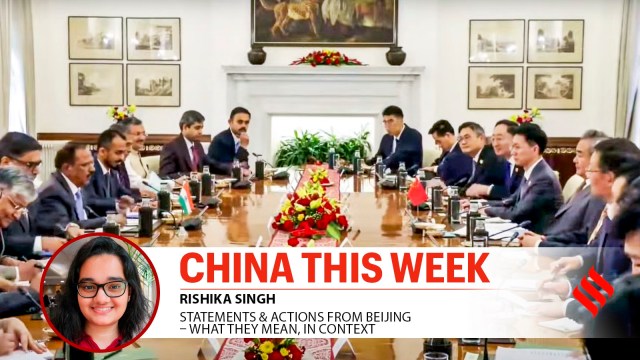Chinese Foreign Minister Wang Yi visited New Delhi over August 18 and 19. He held meetings with National Security Adviser Ajit Doval and External Affairs Minister S Jaishankar, and called on Prime Minister Narendra Modi.

Later in the week, Wang met with the foreign ministers of Afghanistan and Pakistan in Kabul and Islamabad respectively. Among other things, an extension of the China-Pakistan Economic Corridor (CPEC) was discussed. The project has faced several challenges, and India has previously objected to it for its route, which passes through Pakistan-occupied Kashmir (PoK).
Chinese media gave significant coverage to President Xi Jinping’s visit to Tibet for the 60th anniversary of the formation of the Tibet Autonomous Region (TAR) after China annexed the region in 1950.
Here is a closer look at these developments:
1. Takeaways from Wang Yi’s India visit
During his meeting with Wang, PM Modi “reiterated India’s commitment to a fair, reasonable and mutually acceptable resolution of the boundary question”. He also welcomed the “steady and positive progress” in bilateral ties since last October.
In its official release, India “strongly raised the issue of terrorism in all its forms and manifestations, including cross-border terrorism”, and underlined its concerns over the Chinese mega dam construction on the Yarlung Tsangpo (Brahmaputra) river. The Chinese side agreed to share hydrological information during emergencies based on “humanitarian considerations”.
The Chinese readout also said, “Stable, cooperative, and forward-looking India-China relations serve the interests of both countries. Taiwan is part of China.” The somewhat abrupt mention of Taiwan raised questions, given that India has not explicitly mentioned the One-China policy for years in official communication.
Story continues below this ad
India’s statement said there was no change in its position. It said that much like the rest of the world, India had a relationship with Taiwan that focuses on economic, technological and cultural ties and that this would continue. A Chinese spokesperson later expressed “surprise” at the “clarification”.
UPSHOT: Wang’s visit followed the visits of senior Indian ministers to China over the last few months, and came before PM Modi’s visit to Tianjin for the SCO Summit at the end of this month.
Several mechanisms were announced for coordination on border issues, a major area of concern, which showed an intent to develop the bilateral relationship after little forward movement in recent years.
Terrorism continues to be a key issue. Given its close alliance with Pakistan, China sees strategic value in not committing to a more pointed response beyond making some broad affirmations.
Story continues below this ad
It’s unclear what may have prompted the differences over the mention of Taiwan, but it comes amid China’s increasing assertions on the island in recent years.
2. China-Pakistan-Afghanistan dialogue in Kabul
Wang flew to Kabul to meet his counterparts from Afghanistan and Pakistan for the 6th Trilateral Foreign Ministers Dialogue on Wednesday, where he urged deeper cooperation between the countries.
He also visited Islamabad on Thursday and Friday, where he met Pakistani Field Marshal Asim Munir and Prime Minister Shehbaz Sharif.
A report in the Pakistani newspaper Dawn noted that during Munir’s visit to Beijing last month, “the Chinese leadership had lauded the role of the Pakistan Army and hailed it as a “cornerstone of resilience and a vital contributor” for peace in the region.”
Story continues below this ad
UPSHOT: The expansion of the CPEC has been reiterated earlier, too. However, 10 years after it was launched, the project remains mired in challenges. Apart from terror attacks on Chinese workers and infrastructure works, some completed projects like the Gwadar Port in Pakistan are yet to see economic returns.
Structural issues in the Pakistani economy, slowing economic growth in the country, and the resistance to certain projects from Pakistani businesses that are wary of preference being given to Chinese firms are important factors as well. Still, continued investments by China in Pakistan point to the strategic value that both parties see in the relationship. The timing of Wang’s visit, soon after his visit to India, is also significant.
3. Xi Jinping in Tibet
The President led a delegation of senior Chinese leaders to Tibet, as official rhetoric stressed the “comprehensive economic and social development” and the unity of the region with the rest of China. A senior leader wrote in the state-run People’s Daily: “[Tibet’s] GDP has grown 154-fold from 327 million yuan in 1965 to 276.5 billion yuan in 2024, an average annual growth of 8.9%. The mileage of open roads has exceeded 120,000 kilometres.”
He also said, “Tibetan affairs are China’s internal affairs and no external interference is tolerated. Any attempt to split the motherland and undermine Tibet’s stability is doomed to failure.”
Story continues below this ad
Xi noted the need to advance the construction of major projects such as the Yarlung Tsangpo hydropower project and the Sichuan-Tibet Railway “in a vigorous, orderly, and effective manner”.
UPSHOT: Xi’s last visit to Tibet was in 2021, and at 72 years, he is the oldest general secretary or top leader of the Communist Party of China to visit Lhasa, the capital of the region.
The signalling of unity is directed towards the people in the region and to the world at large. It comes not too long after the 90th birthday celebration of the Dalai Lama, the spiritual leader of Tibetans. The focus on infra projects helps create an image of a state that is aiming to foster economic development, rather than deploying repressive tactics that are often associated with it.
Recent developments towards a Xinjiang-Tibet rail network show how a carrot and stick approach has been taken up by the state for many years, with an intensification since Xi assumed power in 2012.








































